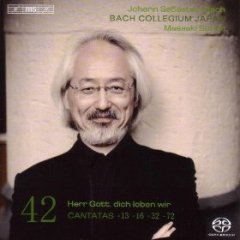Bach – Cantatas Vol.42 (Suzuki)
Bach – Cantatas Vol.42 (Suzuki)

01 – 06. Alles nur nach Gottes Willen, BWV 72 07 – 12. Liebster Jesu, mein Verlangen, BWV 32 13 – 18. Meine Seufzer, Meine Tranen, BWV 13 19 – 24. Herr Gott, dich loben wir, BWV 16 Rachel Nicholls (Soprano) Gerd Türk (Tenor) Robin Blaze (Countertenor) Peter Kooy (Bass) Bach Collegium Japan Masaaki Suzuki - conductor
This series is progressing nicely, and fairly rapidly, Vol. 42 being the current offering, and still concentrating on the Leipzig cantatas from 1725–26, the last flush of such writing that Bach would engage in. 1726 marked a sea change for the composer, in that he apparently did not continue the practice of weekly cantata production, the result being many gaps in the weekly service cycle. Of course, we must labor at least a small degree under the assumption that some (but probably not many) of these works may have been lost. Nevertheless, the flourish of eight cantatas dedicated to the Christmas season of 1725 was to be his last hurrah in Leipzig, and gives us four of the works here.
All things according to God’s will (72) is set to words by Salomon Frank for the third Sunday after Epiphany, based on the gospel passage about the healing of the leper (Matthew). The phrase “Lord, if Thou wilt” appears nine times in the course of the alto recitative alone. The concertante work in the arias displays a confidence and inherent faith in these most pious of texts. Dearest Jesus my desire (32) was called a “Concerto in Dialogo” by Bach, who used the story of the boy Jesus in the temple to offer a work full of contrasts and dialogue between the soul and Jesus, represented here as parallel to the trials we all face when Jesus is lost and then rediscovered the same way he is in the gospel of Luke. Bach uses older traditions from bridal metaphors from the Song of Songs and the Old Testament, and as is traditional makes the soul a soprano and Jesus a bass, despite the fact that he is represented here as a boy. The fourth movement, almost a love duet, is a radiant expression of those sentiments that we find so dear to Bach, and yet he reserves them for only certain times; the melodies are ravishing.
My sighs, my tears (13), for the second Sunday after Epiphany, features only the details of the wedding at Cana (gospel of John). Bach zeroes in on the words of Jesus, “Mine hour is not yet come” in order to show temporary hopelessness and final confidence. A noteworthy episode in this piece is the lamenting tenor, with his accompaniment of two recorders and oboe da caccia, a lovely combination of great delicacy. The second dissonant aria is one of great pathos and abandonment, among the finest things Bach wrote. Finally, Lord God, we praise you (16) is a New Year’s Day cantata, the day of the circumcision and naming of the Lord, though the text by Georg Christian Lehms offers instead Martin Luther’s equivalent of the Te Deum traditionally featured on this day. Bach’s mood in this work hardly constitutes what most Germans of the time would have considered a festive celebration with all the stops pulled out, even though he had previously created such; this piece, premiered in 1726, had only strings, oboes, and organ, though it is possible that the more festive elements of trumpets and horns were omitted because they were needed elsewhere. There is an existing horn part, but it is not part of the original score and was added later at an unknown time, so Bach’s ideas of this piece revolved around a more sedate ensemble. The cantata opens more like a motet (and indeed sounds like one by Bach), with a more Gregorian opening consisting of a cantus firmus -like concept with four bars of continuo alone. But by the time we get to the end, the mood has changed considerably, and even without the festive instrumental additions, Bach manages to put us in a New Year’s disposition. --- Steven E. Ritter, arkivmusic.com








